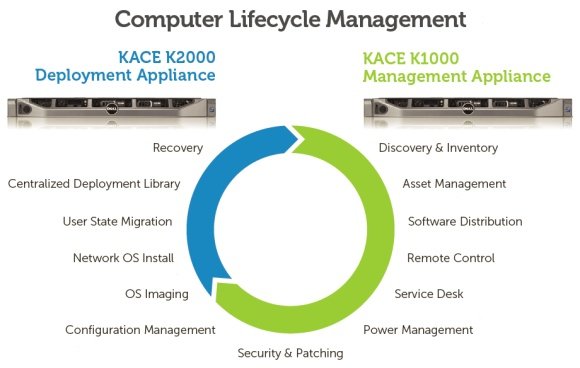This post is also available in: Italian
Reading Time: 3 minutesAbout one year ago Dell announce the acquisition of KACE, a company established in 2003 specializes in delivering appliance-based computer systems management solutions which allow organizations (medium and large to 3.500 devices).
The Kace products family is mainly based on two different product lines with different purposes (and that can work together):
- Dell KACE K1000 Management Appliance fulfills the systems management needs of an organization including device discovery and inventory, software distribution, configuration and policy management, patch management, security audit and enforcement, asset management, service desk, power management, remote control and reporting.
- Dell KACE K2000 Deployment Appliance fulfills the systems deployment needs of an organization including computer inventory scanning and assessment, network OS install, disk imaging, user state migration, remote site management, and system repair and recovery.
The interesting aspect of this kind of products, compared with other software than cover the same tasks, it that they are appliances and can be managed with a web interface. For this reason is could be really simple and fast deploy those products, compared to other solutions (see also “Best Practices in Lifecycle Management: Comparing Suites“)
Actually there isn’t an offert as an external cloud service, and the entry level of those products (from 100 devices) could be too high for small company (to be honest there is a specific product for them, the M300 Asset Management Appliance, that is a small and limited version of the K1000).
Some month ago, Dell has announced the new products devices: K1100-ADV and K2100-ADV, both based on standard PowerEdge (1U) hardware with Intel Xeon quad-core and RAID 5. The K1100-ADV has 12 GB of RAM, the K2100-ADV has 6 GB of RAM.
Instead of use the hardware appliances, there are also a virtual solution (VK1000 and KV2000), with the advantage that they do not add new hardware and can benefit from the high availability, business continuity and data protection solutions provided by the virtual infrastructure. Note that actually only VMware is supported ad a virtual platform (and the virtual appliance is an OVF), for the other platforms the limit is that the guest OS used in those appliances (FreeBSD) may be not supported. Also note that the virtual disk is a single 250 GB file, so a thin provisioning could be required to do not wast too much space.
On the official web site there are some demo, and also the trial versions of the virtual appliances.



